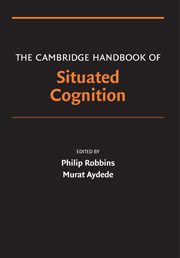Book contents
- The Cambridge Handbook of Situated Cognition
- The Cambridge Handbook of Situated Cognition
- Copyright page
- Contents
- Acknowledgments
- Contributors
- Part I Backdrop
- Part II Conceptual Foundations
- Chapter 4 How to Situate Cognition
- Chapter 5 Why the Mind Is Still in the Head
- Chapter 6 Innateness and the Situated Mind
- Chapter 7 Situated Representation
- Chapter 8 Dynamics, Control, and Cognition
- Chapter 9 Explanation
- Chapter 10 Embedded Rationality
- Part III Empirical Developments
- Index
Chapter 8 - Dynamics, Control, and Cognition
from Part II - Conceptual Foundations
Published online by Cambridge University Press: 05 June 2012
- The Cambridge Handbook of Situated Cognition
- The Cambridge Handbook of Situated Cognition
- Copyright page
- Contents
- Acknowledgments
- Contributors
- Part I Backdrop
- Part II Conceptual Foundations
- Chapter 4 How to Situate Cognition
- Chapter 5 Why the Mind Is Still in the Head
- Chapter 6 Innateness and the Situated Mind
- Chapter 7 Situated Representation
- Chapter 8 Dynamics, Control, and Cognition
- Chapter 9 Explanation
- Chapter 10 Embedded Rationality
- Part III Empirical Developments
- Index
Summary
- Type
- Chapter
- Information
- The Cambridge Handbook of Situated Cognition , pp. 134 - 154Publisher: Cambridge University PressPrint publication year: 2008
- 1
- Cited by

